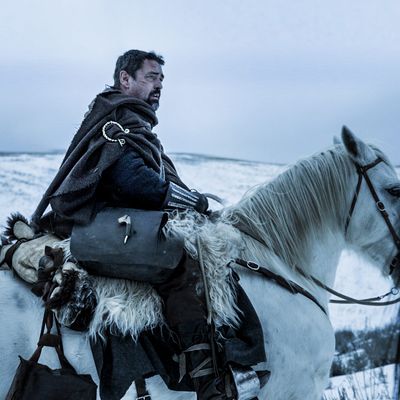
In Robert the Bruce, Angus Macfadyen reprises the role of the Scottish rebel king he played 25 years ago in Mel Gibson’s Braveheart, but the new movie is quieter, more intimate, with less bloody spectacle. A lot less. Presumably because it’s hard to stage a proper battle with six or seven mangy-looking extras, Robert sits and broods on whether he should pick up his sword and continue the war of William Wallace (last seen being pulled apart by horses, screaming, “Freeeeeeedommmmm!”) or put an end to all the bloodshed happening offscreen. Last year’s Netflix epic The Outlaw King covered this period of low-lying and introspection — remembered for the fugitive king’s epiphany while watching a spider spin its web — in about ten minutes, but the Robert of Robert the Bruce is a veritable fountainhead of indecision. Recuperating from a near-mortal wound in the rustic house of a widow and her brood, the fugitive king struggles with the age-old question: Wouldn’t it be better for the Scots to live under the aegis of the British crown?
The answer was no, of course — and still is, if you ask me, and not just because of Brexit. The Scots have a different temperament, a different sense of humor, a different outlook on life. They should nae dally more but get oot— sorry. I’ve wanted to be a Scot since I spent a summer roaming the country’s glens, lochs, and distilleries while listening to the songs of Ivor Cutler: “I need nothing/ I’ve everything I need/ I walk along the dusty road/ A doughnut in my hand … ” I was a goner even before Bill Forsyth’s Local Hero prompted an existential crisis.
Back to Robert the Bruce. It opens with the famous 1306 meeting between Robert and his Scottish rival John “the Red” Comyn at the Church of the Greyfriars at Dumfries. There are many versions of what happened that day: Comyn lured Robert into a trap; Robert lured Comyn into a trap; Comyn threatened to tell King Edward I of Robert’s plan to resume Wallace’s war, whereupon Robert stabbed him; Comyn disparaged Robert’s family, prompting Robert to wound him, leave the church, and let one of his surrogates deliver the death blow … Robert the Bruce puts the moral blame all on Comyn (a snarling guest appearance by Jared Harris), but the over-fancy syntax and muddy staging makes it tough to know what’s going on in the scene. Robert rides off, is excommunicated by the Church, and, years later, announces to his meager band, “Leave me, we’re done. Go home. God chooses kings … not men.” Challenged on this by a disappointed ally, he points to his soldiers. “Look at those faces,” he says. “They’re done. They have no fight left in them.” Three of them promptly prove the Bruce wrong by riding after him and trying to lop off his head for the bounty England has put on him.
Robert manages to vanquish his first pursuers, but he remains a fugitive and is on death’s dark threshold when a girl and her brother find him unconscious against a tree and call their ma, Morag (Anna Hutchison) — a strangely witchy name for an angel of light. Morag’s husband died fighting under Robert, but unlike many other Scots (among them her greedy, lustful brother-in-law, who insists, “Men were stolen from us by [Robert’s] vanity”), she feels no bitterness toward her king-in-exile. Quite the reverse. While he dithers, she prevails upon him to resume the fight. The Scots need to know their men died for something, she says, to which he answers, “Uyblagd nae sentrich a’ wo.” That’s what I wrote down, anyway. Subtitles would not have been amiss.
If I’ve made Robert the Bruce sound laughable, I’ve misrepresented it. It’s not bad at all. Though he is unusually uncharismatic, Macfadyen (who co-wrote the script) is an excellent actor, and Richard Gray directs ably. But that word — “ably.” I never used it before. It’s the bottom of the neutral zone, before you dip into negative territory. The problem is less what the movie does than what it doesn’t do, i.e., hit any high notes. If Robert doesn’t resolve to fight, there’s no movie, so you know that he will and that he’ll get back his sword (presently in the hands of Morag’s rat-fink brother-in-law), train Morag’s kids — the next generation of Scottish warriors — in a brief montage, and take on his enemies. Six of them, in this case.
There’s one distinctive aspect of Robert the Bruce: It creates suspense without an Englishman in sight. By focusing on an internal struggle within a larger one, it dramatizes the kind of internecine conflict that turns so many wars into a bloody muddle of competing interests and egos. Recently, that country was evenly split between staying in or seceding from the United Kingdom, which compels me to point out that the people in the film on Robert’s side are far more honorable, industrious, and attractive than the ones who want to bring his head to England on a pike. A dinnae ken wha that means but Scots shuid reckon wi’ it afore it’s tae late.
More Movie Reviews
- The Craziest Musical of the Year Is Finally Here
- Shouldn’t Nosferatu Be Scarier?
- Julianne Moore and Tilda Swinton Are Perfectly Imperfect Together


